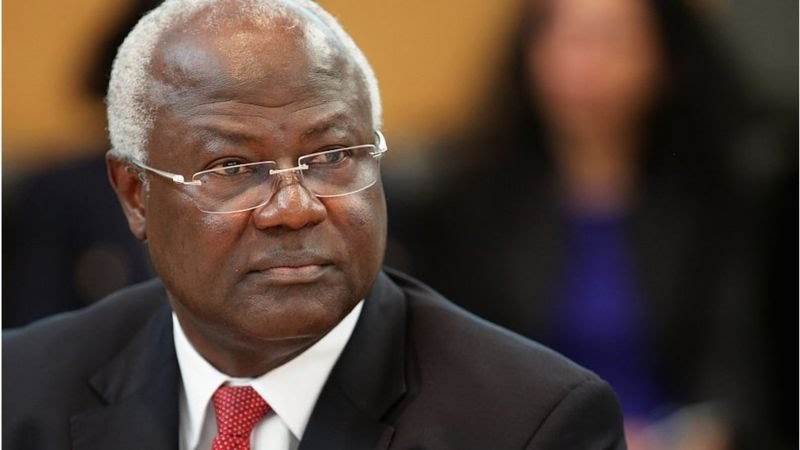Freetown, SIERRA LEONE —Former President Ernest Bai Koroma of Sierra Leone has been granted permission to travel abroad on medical grounds despite facing treason charges.
The High Court ruling comes amid speculation that Ernest Bai Koroma has agreed to go into exile in Nigeria if charges against him were dropped.
He was accused of treason and other offences over a failed coup last November, in which some 20 people died.
Mr Koroma, who ruled between 2007 and 2018, denies these allegations.
A court order Wednesday shows Mr Koroma is allowed to travel to Nigeria for medical reasons.
The order stipulates that he must not stay there for more than three months and that he must appear before a Sierra Leonean magistrates court on 6 March.
During last year’s attack, gunmen broke into a military armoury and several prisons in capital city Freetown, freeing almost 2,000 inmates.
The government described it as an attempted coup and earlier this month, Mr Koroma was charged alongside 12 others suspects.
Anonymous sources from the United Nations and Ecowas, a bloc of West African countries, said that ECOWAS had brokered a deal for Mr Koroma to go into exile in Nigeria if the charges were dropped.
The for President Koroma in a letter, had agreed to the deal, which would see him continue to enjoy the perks of a former president even while he was in Nigeria.
Sierra Leone’s information minister Chernor Bah, said that the court’s decision to grant bail to the former President is consistent with the government’s determination to allow the rule of law to take its course.
He also said that the treason trial will continue in Koroma’s absence as there are other accused persons who have been charged with treason and are appearing in court.
The charges against former President Koroma he said, will remain open until such time that he returns to Sierra Leone. The trial is expected to resume in March 2024.
But the Sierra Leone Foreign Minster Timothy Kabba previously said the government did not support the proposal, which he described as a “unilateral proposition” by the president of the ECOWAS Commission.
ECOWAS has been concerned about heightened tensions in Sierra Leone following the coup attempt. In the 1990s Ecowas closely witnessed the horrors of a brutal civil war in the West African country and sent a peacekeeping force to help end the conflict.
Some diplomats believe Koroma will not return from Nigeria after travelling there on medical grounds and that the court order in effect allows him to go into exile as a way of restoring calm to the country.
President of Nigeria, Bola Tinubu has reportedly agreed to allow the former President to stay in Nigeria for as long as is necessary.
Koroma was president for 11 years until 2018, when current President Julius Maada Bio was elected.
The former president’s daughter, Dankay Koroma, has previously been named on a list of suspects wanted by police investigating the failed coup. She has not commented.
The attempted coup came five months after a disputed election which saw President Bio narrowly re-elected for a second term.
The results were rejected by Koroma’s All People’s Congress. International observers also criticised the elections, highlighting a lack of transparency in the count.
Koroma has been serving house arrest since he was detained in November 2023, following what the government say was an attempted coup on 26th November 2023, when several shots were fired at various locations in the capital Freetown, including the military ammunition store at Wilberforce as well as the breaking of prison cells which saw thousands of escaped prisoners, many of whom have since returned to their cells.
Leaders of the West African regional block – ECOWAS and the leadership of the main opposition APC, of which President Koroma is its former chairman and leader, had privately called on President Julius Maada Bio to allow the former president to leave the country.
Sierra Leone remains tense, following general and presidential elections which were held in June 2023, the results of which international election observers have described as lacking transparency and integrity.
The main opposition APC say that the elections were rigged to favour President Bio, who is now serving his second and final term in office.
After months of political impasse, the Commonwealth, the African Union and other international partners in the country brokered a peace accord between the government and the APC, with strict terms and conditions, including a review of the country’s elections machinery, systems, processes and laws, and the release of all political prisoners, many of whom APC supporters say have been secretly killed by security forces and ruling party agents.
By Umaru Fofana |BBC
Abdul Rashid Thomas | Sierra Leone Telegraph
